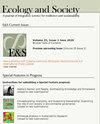Leveraging emotion-behavior pathways to support environmental behavior change
IF 3.2
2区 社会学
Q1 ECOLOGY
引用次数: 6
Abstract
Many global environmental threats are driven by human behavior and require behavioral solutions. Researchers in the environmental field have recently begun seeing the behavioral sciences as core to changing behavior for conservation; yet leveraging human emotions remains an underused tool for behavior change compared to others like social norms. Humans experience a range of emotions that each cause distinct patterns of behavior depending on unique contexts; this presents an opportunity to leverage emotions to support behavior change goals. The existing literature offers minimal guidance about which specific emotions to use in which contexts and how those emotions might lead to certain behaviors. In the environmental field specifically, there have been mixed results on using emotions, resulting from an incomplete understanding of the causal relationship between particular emotions, contexts, and environmental behaviors. We propose that adopting a functionalist approach, which describes emotions as functional states designed to produce particular outcomes in specific contexts, will help to unlock emotions as a tool for conservation. To demonstrate this approach, we identify fear, joy, hope, anger, pride, interest, and the prospect of shame as particularly relevant for environmental behavior change. Based on an understanding of each emotion’s function, we developed an emotion-behavior pathway that describes the expected outcome of using an emotion in a particular context. Applying these emotional-behavior pathways can allow both researchers and practitioners to advance the science of shifting environmental behavior through emotion.利用情绪-行为途径支持环境行为改变
许多全球环境威胁是由人类行为驱动的,需要行为解决方案。环境领域的研究人员最近开始将行为科学视为改变保护行为的核心;然而,与社会规范等其他工具相比,利用人类情绪仍然是一种未被充分利用的行为改变工具。人类经历了一系列的情绪,每种情绪都会根据独特的环境产生不同的行为模式;这提供了一个利用情绪来支持行为改变目标的机会。现有的文献对在何种情况下使用哪些特定情绪以及这些情绪如何导致某些行为提供了最低限度的指导。具体来说,在环境领域,由于对特定情绪、情境和环境行为之间的因果关系的不完全理解,使用情绪的结果喜忧参半。我们提出,采用功能主义方法,将情绪描述为旨在在特定环境中产生特定结果的功能状态,将有助于释放情绪作为一种保护工具。为了证明这种方法,我们确定恐惧、喜悦、希望、愤怒、自豪、兴趣和羞耻感与环境行为的变化特别相关。在了解每种情绪的功能的基础上,我们开发了一种情绪行为路径,该路径描述了在特定环境中使用情绪的预期结果。应用这些情绪行为途径可以让研究人员和从业者推进通过情绪改变环境行为的科学。
本文章由计算机程序翻译,如有差异,请以英文原文为准。
求助全文
约1分钟内获得全文
求助全文
来源期刊

Ecology and Society
环境科学-生态学
CiteScore
6.20
自引率
4.90%
发文量
109
审稿时长
3 months
期刊介绍:
Ecology and Society is an electronic, peer-reviewed, multi-disciplinary journal devoted to the rapid dissemination of current research. Manuscript submission, peer review, and publication are all handled on the Internet. Software developed for the journal automates all clerical steps during peer review, facilitates a double-blind peer review process, and allows authors and editors to follow the progress of peer review on the Internet. As articles are accepted, they are published in an "Issue in Progress." At four month intervals the Issue-in-Progress is declared a New Issue, and subscribers receive the Table of Contents of the issue via email. Our turn-around time (submission to publication) averages around 350 days.
We encourage publication of special features. Special features are comprised of a set of manuscripts that address a single theme, and include an introductory and summary manuscript. The individual contributions are published in regular issues, and the special feature manuscripts are linked through a table of contents and announced on the journal''s main page.
The journal seeks papers that are novel, integrative and written in a way that is accessible to a wide audience that includes an array of disciplines from the natural sciences, social sciences, and the humanities concerned with the relationship between society and the life-supporting ecosystems on which human wellbeing ultimately depends.
 求助内容:
求助内容: 应助结果提醒方式:
应助结果提醒方式:


